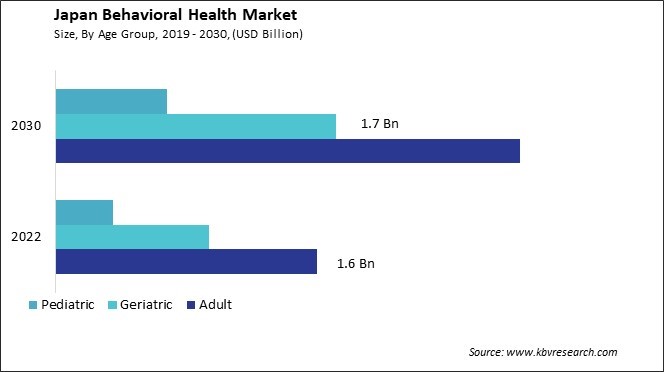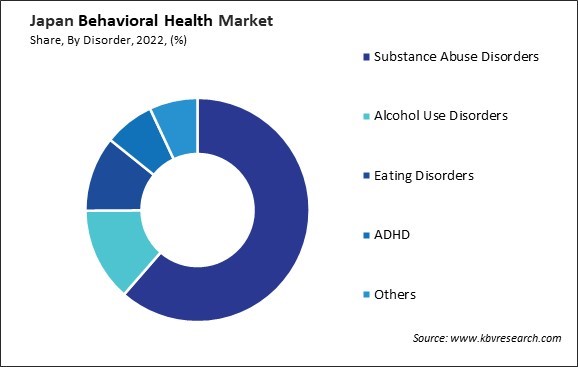The Japan Behavioral Health Market size is expected to reach $5.3 billion by 2030, rising at a market growth of 7.8% CAGR during the forecast period.
The behavioral health market in Japan has undergone significant transformations in recent years, reflecting shifts in societal attitudes, government policies, and healthcare practices. Japan, like many other developed countries, faces challenges related to mental health disorders, substance abuse, and other behavioral health issues. One key driver shaping Japan's behavioral health market is the country's aging population. With a rapidly increasing proportion of elderly citizens, there is a growing demand for mental health services to address age-related conditions such as dementia, depression, and anxiety. According to the International Trade Administration, the proportion of the population older than 65 will rise from 29% to 40 % by 2060. As the elderly population grows, there will be an increased demand for mental health services and support tailored to their specific needs.

In recent years, the Japanese government has reformed the mental health system and improved access to care. Policies aimed at integrating mental health services into primary care settings, expanding insurance coverage for mental health treatments, and enhancing community-based support networks have been introduced to address gaps in the existing healthcare infrastructure.
The COVID-19 pandemic has further highlighted the importance of mental health services in Japan. The prolonged isolation, economic uncertainty, and fear associated with the pandemic have exacerbated existing mental health issues and created new challenges for individuals and communities. As the country navigates the ongoing impact of the pandemic, there is a heightened awareness of the need for robust mental health infrastructure and support systems.
The Japanese workplace landscape is experiencing a significant shift towards prioritizing mental health, with the rising adoption of workplace mental health programs contributing to the growth of the behavioral health market. One key driver of this trend is the growing acknowledgment of the prevalence of mental health issues in the workplace. Stress, anxiety, depression, and burnout have become increasingly recognized as significant challenges faced by employees across various industries in Japan. This acknowledgment has led to a greater emphasis on addressing mental health concerns within the workplace.
According to the National Library of Medicine, mental health among Japanese employees indicates that a significant portion, 54.2%, are experiencing distress stemming from work-related stressors. These stressors primarily originate from factors such as heavy workloads (42.5%), difficulties in work relationships (35.0%), and the nature of their tasks (30.9%). This underscores the pressing need for interventions and solutions within Japan's behavioral health market to address these challenges and promote healthier work environments.
Furthermore, there has been a cultural shift towards openness and destigmatization surrounding mental health issues in Japan. Research has shown that addressing mental health concerns in the workplace leads to increased employee engagement, higher productivity, reduced absenteeism, and improved overall workplace morale. As a result, organizations in Japan are increasingly implementing various mental health initiatives, ranging from employee assistance programs (EAPs) to mindfulness training and stress management workshops.
Moreover, changes in societal attitudes towards mental health are also influencing the adoption of workplace mental health programs in Japan. There is a greater willingness to openly discuss mental health issues, reducing the stigma associated with seeking help. Therefore, Japan's evolving workplace landscape reflects a growing prioritization of mental health, driven by increased awareness and the recognition of the significant impact of mental health on employee well-being and organizational performance.
In recent years, Japan has witnessed a significant surge in the demand for outpatient counseling services within the behavioral health market. One driving force behind this increased demand is the growing recognition and acceptance of mental health issues in Japanese society. Additionally, the prevalence of stress-related disorders, such as anxiety and depression, has risen in Japan, particularly among the younger demographic. Factors such as academic pressure, intense work culture, and social isolation have contributed to an increase in mental health issues among Japanese youth. As a result, there has been a corresponding rise in demand for outpatient counseling services tailored to these needs.
Moreover, technological advancements have made it easier for individuals to access counseling services remotely, further contributing to the increased demand for outpatient counseling. Teletherapy platforms and online counseling services have become increasingly popular in Japan, particularly among those who face barriers to accessing traditional in-person counseling.
Furthermore, changes in healthcare policy and increased government funding have also played a role in driving the demand for outpatient counseling in Japan. The government has recognized the importance of mental health care and has taken steps to improve access to services, including outpatient counseling. Hence, Japan's growing recognition of mental health issues, coupled with technological advancements and supportive government policies, has fueled a significant surge in demand for outpatient counseling services.

In Japan, the behavioral health market has been experiencing significant growth and transformation, albeit within a cultural context that traditionally stigmatizes mental health issues. One notable player in the Japanese behavioral health market is TELL (Tokyo English Lifeline), a non-profit organization that provides confidential mental health support to the international community in Japan. TELL offers telephone counseling, face-to-face counseling, and support groups to individuals struggling with various mental health issues, including depression, anxiety, and relationship problems. The organization also conducts outreach programs to raise awareness about mental health and reduce the stigma of seeking help.
Additionally, there are companies in Japan specializing in telemedicine and digital health solutions for mental health. MRT Corporation, for example, offers telepsychiatry services connecting patients with licensed psychiatrists via video conferencing. This allows individuals in remote areas or those facing barriers to accessing traditional mental health services to receive timely and convenient care. MRT Corporation also develops software solutions for mental health assessment and monitoring, enabling healthcare providers to track patient progress and adjust treatment plans as needed.
Moreover, there are companies in Japan focusing on workplace mental health and employee well-being. With the increasing recognition of the impact of mental health on productivity and performance, employers are seeking ways to support the mental well-being of their employees. One such company is LifeNet International, which provides employee assistance programs (EAPs) and mental health training to businesses across Japan. These programs offer counseling services, stress management workshops, and resources for employees dealing with mental health challenges.
Furthermore, there are companies in Japan leveraging technology to deliver innovative mental health interventions. For example, Digital Therapy Corporation develops mobile apps and online platforms that deliver evidence-based cognitive behavioral therapy (CBT) programs for common mental health conditions such as depression and insomnia. These digital therapies provide users self-guided tools and techniques to manage their symptoms and improve their overall well-being.
Moreover, there are companies in Japan collaborating with healthcare providers and government agencies to improve mental healthcare delivery and infrastructure. For example, the Japan Medical Association has launched initiatives to train primary care physicians in identifying and managing mental health disorders, thereby increasing access to mental health services at the community level. As the demand for mental health services continues to grow, these companies will likely play an increasingly important role in shaping the future of behavioral healthcare in the country.
By Age Group
By Disorder
By Service
Our team of dedicated experts can provide you with attractive expansion opportunities for your business.

